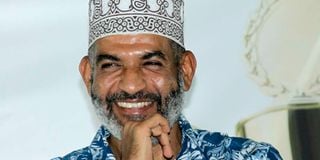Premium
Infotrak: Mvita MP most popular Mombasa governor candidate

Mvita MP Abdulswamad Nassir. An opinion poll conducted by Infotrak shows that if elections were held today, he would win the Mombasa governor's seat.
If the General Election was to be held today, Mvita MP Abdulswamad Nassir would emerge as Mombasa governor with 48 per cent of the votes, beating his five close contestants, according to an Infotrak opinion poll released on Sunday.
The latest Infotrak poll on awareness and popularity of gubernatorial aspirants showed businessman Suleiman Shahbal (ODM) following closely with 18 per cent, UDA’s Hassan Omar is at five per cent, Wiper’s Ali Mbogo at four per cent and William Kingi (ODM) at one percent. However, 21 per cent of the voters are undecided.
Mr Nassir’s popularity is at 82 per cent, Shahbal’s 67 percent, the former Mombasa senator Omar is 35 per cent while Mbogo, the current Kisauni MP, is at 16 per cent.
Releasing the results in Nairobi, Infotrak’s Research Manager Johvine Wanyingo said the highest response of 57 per cent was received from respondents aged between 18 and 35 years.
“Gender wise, males comprised 54 per cent and females 46 per cent, cutting across different religions. We, however, did not ask those who were undecided why they had not made up their minds,” he said.
Mr Shahbal has twice lost in the gubernatorial race to Governor Joho, forcing him to decamp from ODM to Wiper in 2013 and later to Jubilee in 2017. But he is optimistic about clinching the seat in the forthcoming general elections after re-joining ODM, a party which is popular in Mombasa.
Vigorous campaigns
Mr Nassir, Mr Shahbal, Mr Omar and Mr Mbogo have been conducting vigorous campaigns in the county, with the Mvita MP getting a major boost after he was endorsed by his ally, Mr Joho, who is serving his second and last term.
In the opinion poll conducted between March 9 and 12, Mr Nassir’s popularity in Mvita is at 62 per cent, Likoni 53 per cent, Nyali 46 per cent, Kisauni 40 per cent, Jomvu 49 per cent and Changamwe 42 per cent. He is followed closely by Mr Shahbal who in Changamwe has 21 per cent popularity, Jomvu 18 per cent, Kisauni 16 per cent, Nyali 17 per cent, Likoni 19 per cent and Mvita 15 per cent.
ODM leader Mr Raila Odinga has many several attempts to make truce between Mr Nassir and Mr Shahbal after the two began engaging in fierce political wars, causing tension, with their supporters clashing during campaigns. The recent spat was during the World Women’s Day celebrations when their supporters clashed.
“When two bulls fight it’s the grass that gets hurts. But we don’t want our grass to get hurt. We want the nominations to be friendly. We don’t want violence. You do not have to carry rods to come to a political rally. These two are not enemies, they are just in a political contest,” said Mr Odinga in February during Azimio La Umoja rally at Tononoka grounds.
Mr Nassir has made inroads in Jomvu and Likoni areas where he has been vigorously campaigning whereas his opponent, Mr Shahbal, has equally been getting massive support in Changamwe and Kisauni areas where he has the highest popularity rates in the county. This is attributed to the support he has received from Changamwe Omar Mwinyi.
On the other hand, Mr Nassir has the support of Mombasa Senator Mohamed Faki Mwinyihaji, MPs Badi Twalib (Jomvu), Mishi Mboko (Likoni) and Woman Rep Asha Hussein.
In the poll that was commissioned by Haki Africa, a human rights group in Mombasa, Senator Faki is still popular at 41 per cent followed by UDA’s Hamisi Mwaguya. Others are Mohammed Abass at seven per cent, Hisham Mwidau at seven per cent, Faris Rubeya at six per cent, Abdallah Said at four per cent and Mohammed Amir at one per cent.
Issues of concern
Among the key issues that Mombasa voters want the aspirants to address include unemployment, high cost of living, access to clean water, insecurity, transport, infrastructure and roads and youth and women empowerment.
ODM is still the most popular party at 46 per cent, UDA, 24 per cent and Jubilee two percent.
Azimio La Umoja’s popularity is at 51 percent, Kenya Kwanza Alliance 23 per cent and One Kenya Alliance three per cent.
Overall, ODM leader Raila Odinga emerged as the leading presidential aspirant of choice at 52 per cent, followed closely by UDA’s William Ruto at 29 per cent and Wiper’s Kalonzo Musyoka was third at one per cent.
Haki Africa said the purpose of the study was to map out volatile areas due to insecurity concerns ahead of the polls.
The lobby group is investigating how insecurity will be a factor in the forthcoming general elections, saying this will help it to map out areas that will need monitoring.






